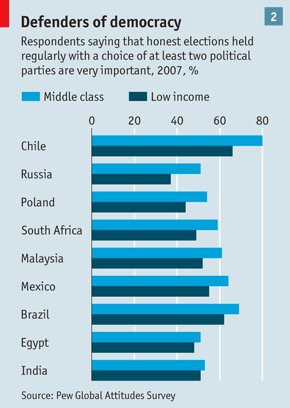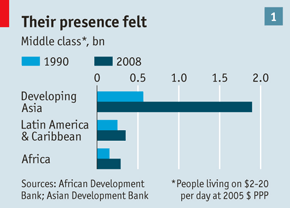| 新兴市场的政治 新的中产阶级出现 马克思主义革命的中产阶级再一次表达他们的愿望  012 Briefing - Politics in emerging markets.mp3 012 Briefing - Politics in emerging markets.mp3
Sep 3rd 2011 | from the print edition  四年以来,发达国家遭遇的经济衰退和新兴国家蓬勃发展之间形成鲜明对比。今年,发达国家的经济困境已经波及到政治领域:欧洲多国政府因欧元危机陷入停滞,同时美国政局因主权债务信誉降级而备受困扰。但是,困境不仅仅只出现在发达国家。像中国、印度、印度尼西亚和巴西——且不讨论中东地区——抛开这些国家的经济成就不说,同样也经受着大众的不满,与西方国家存在的诟病一样。 以曼莫汉•辛格(Manmohan Singh)为首、国会领导的印度政府面临着有史以来最大的挑战:安纳•哈扎尔(Anna Hazare)的支持者进行大规模的抗议示威,安纳•哈扎尔(Anna Hazare)是反腐运动的老手,在德里进行了绝食抗议。本周,在政府同意通过更为严格的反对贪腐法律后,哈扎尔停止了绝食抗议,喝了一杯蜂蜜椰子汁。此次抗议是一系列巨大的腐败丑闻的高潮:从去年在德里举行的英联邦运动会到2G移动电信运营牌照的发放。财政部的前官员Mohan Guruswamy 说:“大街上抗议者都是中产阶级。” 中国也发生了抗议行为。8月中旬,在东北新兴都市的大连爆发了自天安门事变以来的最大规模的抗议示威活动,迫使当局关闭了一家在暴雨中损毁的化工厂。这种规模的群众示威和政府妥协虽然不是空前的,但是却是及其不寻常的。本次示威活动让人想起2007年因相同的项目而发生在中国南方城市厦门的强烈抗议。这次事件被看作是中国中产阶级在面对政府滥用环境问题上新的意愿的第一大例子。而且,大连抗议事件仅仅在大众怒火爆发后的几周内爆发,主要是通过诸如新浪微博这样的微型博客服务来表达,新浪微博就是责怪官员对两列新的高速火车相撞造成39人死亡的忽视。批评声广泛传播,以至于国家监督的媒体也加入进来。 动车相撞事故更加敏感的原因是,二月份中国国会上(十一届全国人大常委会第十九次会——译者注),罢免了负责建造高速铁路网络的铁道部部长职务。他被指控贪污10亿元(1520万美元)以及有18个情人。随后铁道部另一个高级官员因贪污被免职,国家审计人员说高速铁路系统中上百万资金被挪用。 巴西也存在同样的问题,内阁解雇的浪潮达到了顶峰。自6月以来,总统迪尔玛•罗塞夫(Dilma Rousseff)已经解雇了最高行政官、交通部长和交通部门的很多官员,以及农业部副部长,他们都是因为各种各样不端行为而下台。农业部部长自己请辞。超过30名旅游部官员,包括副部长因涉嫌盗窃而被捕。而且,这不是第一次这么大规模的腐败——前总统费尔南多•科洛尔•德梅洛(Fernando Collor de Mello)因腐败指控而遭到弹劾——而且巴西和其他国家的一个比较大的区别在于,似乎是总统领导来解决事情,但这无疑是罗塞夫八个月前就职总统以来最大挑战。 中产阶级急速增长 在发达国家,政府的耻辱主要是经济下滑的结果和控制公共财政的问题。相反的是,新兴市场保持经济增长,而公关支出(大部分)得到控制。政治困境的原因必定在其他方面。印度和中国最可能出现的就是因不断增长的中产阶级规模而对政治需求,当然可能其他新兴国家也存在。 根据世界银行的马丁•拉瓦雷(Martin Ravallion)估计,每天收入在2美元到13美元之间的中产阶级,亚洲发展国家中从1990到2005年之间增长了三倍,达到了15亿,同期拉丁美洲的中产阶级人口从2.27亿增长到3.62亿,而撒哈拉以南非洲中产阶级人口从1.17亿增长到1.97亿。亚洲和非洲发展银行较新的估计显示,如果将中产阶级定义为每日收入在2美元到20美元之间的话,同样证实了以上的说法(见图表),在2008年,中产阶级(以他们的定义来算,其中还包括很多仅仅脱离贫困线的人)的人口达到了非洲人口的三分之一,拉丁美洲人口的四分之三以及差不多90%的中国人口。 民调显示中产阶级的价值观念是与众不同的。位于华盛顿的皮尤全球态度调查对13个新兴国家进行的一项调查显示,中产阶级在言论自由和公平选举方面要比无产阶级更加看重,而无产阶级比中产阶级更加关心摆脱贫穷(见图表2)。这些区别看起来很平常,但是却存在一定的影响,因为这些区别意味着当中产阶级增多,关于管理的抽象观念将在政治中扮演越来越重要的角色。 这似乎正在发生,印度周刊《开放》的编辑Manu Joseph为了支持哈扎尔将抗议称之为“一场自以为是的中产阶级起义”。此次抗议成效显著,部分原因是他们通过有限电视24小时直播抗议活动,大范围的中产阶级能够通过电视看到抗议活动。示威者中包括印度新中产阶级的象征,诸如穿制服的商人和宝莱明星,但是却鲜有衣着朴素的农民。 中国的大连是一个富裕的港口城市,一直以来与不断增长的中产阶级有关。位于北京的中国政法大学的杨洋说:“中产阶级对政府的影响要比普通老百姓的影响大的多。”高速铁路系统主要是中产阶级关心的问题,因为只有中国新的精英分子才能承担的起高铁票价。香港专栏作家潘彩富认为“动车事故最直接的后果是点燃了中产阶级的怒火。”媒体对事故评论的一个例子,国家运营的中央电视台的一名播音员转向镜头不是播报新闻,而是进行对中产阶级抱怨的诽谤中,他问道:“我们居住的公寓能够不倒塌么,城市中我们行驶的道理能够不坍塌么,我们可以乘坐安全的火车么?”而穷人不住城市公寓,不开车、也不会乘坐高铁。 其他新兴市场中,新的中产阶级的影响要比这小一些。但是上周智力遭遇了大罢工,部分是因为公共部门在中产阶级普遍关心的教育问题上扮演的角色。对于阿拉伯爆发家长作风的独裁政府无法适用于受过教育、使用微博的社会。“富裕的人们、想要新的机会的人们才是将政治新语言在中东发扬广大的人。”奥巴马前管理顾问Vali Nasr这样说。 某种程度上,让人吃惊的不是正在发生着什么,而是发生了多久。多年来,新兴市场的新中产阶级在政治上一直保持沉默。在中国,由于共产党提供的绝对社会契约,他们只能不与人来往。你让我们来统治,我们会让你变得富有。虽然原因不同,但是民主的结果是类似的。印度和巴西新精英在政治影响力的不但比穷人要小(因为穷人的数量多,所以他们在选举方面更加重要),而且比年长的精英也少,他们借助于权利确立了他们的社会地位。在印度,据说城市里的中产阶级比农村的贫困人口投票要少,而在巴西,罗塞夫富人和其前任路易斯•伊纳西奥•卢拉•达席尔瓦都是归功于最贫穷人的大力支持才赢得选举。总体上来说,中产阶级一直保持沉默另一个原因就是,印度、中国和巴西追求的自由和现代化政策使中产阶级收益。直到现在,他们已经开始了一场悄无声息的革命。 新中产阶级激进主义没有单一的解释。考虑到他们的人数上升,这可能是注定要在某时刻发生的。微博服务的传播确实带来一些变化。新浪微博宣称有1.4亿用户,大部分来自中国城市中产阶级。他们在几天时间内发布了一千万条关于动车事故的微博。近来,中国这个新兴巨擎已经失去了一些经济前景,这可能带来影响——不是(像西方国家一样)通过裁员和减少政府服务,而是通过对经济的强劲增长产生怀疑。一些观察家(似乎包括中国共产党)甚至担心示威者可能放胆去复制阿拉伯暴乱,虽然看起来很牵强。 与动荡不安的中东国家相反,印度和中国的中产阶级的激进主义的目的不是使政府垮台。相反,他们关注更为狭窄的方面:腐败。哈扎尔想要建立一个反腐败特派员。动车事故激发了中国的中产阶级愤怒,部分原因是由于铁道部的腐败:铁道部部长收集的手表的照片在网上疯狂流传。另一个新兴巨头印尼,对总统苏西洛来说最大的问题是一项由消除腐败委员会着手进行的调查,调查内容是价值3.5亿美元的政府合同。在委员会获得将其拘禁在家中的逮捕证的前一天,执政党的前财务大臣逃到哥伦比亚,随后他牵连了其他高级官员进入骗局,现在他已被带回国面临指控。 从反对腐败到支持民主 把注意力集中到腐败这一点表明:目前,广义上来说,中产阶级激进主义是一种抗议运动,而不是一股政治力量。他们试图让政府改革,而不是取代它。但那是可以改变的。在大多数中等收入国家,腐败不仅仅是一种犯罪行为,也是以旧方式从事政治的后果,这个后果是无法解释的、不透明的、非民主的。班加罗尔社会和经济变化学院的Ashutosh Varshney认为,富裕的印度人不那么憎恨腐败的原因是资金被浪费了——这些浪费他们承担得起,他们想要政府清廉是出于自己的目的:“中产阶级维护他们的公民权利,不需要贿赂就能获得政府服务。 在这些情况下,反腐抗议很容易演变成范围更广的情况。过去人们常说,新兴中产阶级在政治不会活跃。现在,他们“只是”反对腐败。两种观点都低估了中产阶级增长的后果。正如马克思所说:“历史上,(资产阶级)在在欧洲扮演了最具革命性的部分”。在新兴市场,这个革命现在看起来越来越近。 from the print edition | Briefing
  |



 |小黑屋|手机版|网站地图|关于我们|ECO中文网
( 京ICP备06039041号 )
|小黑屋|手机版|网站地图|关于我们|ECO中文网
( 京ICP备06039041号 ) 
GMT+8, 2025-10-29 01:06 , Processed in 0.101925 second(s), 28 queries .
Powered by Discuz! X3.3
© 2001-2017 Comsenz Inc.